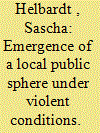| Srl | Item |
| 1 |
ID:
139603


|
|
|
|
|
| Summary/Abstract |
Community radio has strongly changed Thailand's centralised media landscape. This article analyses community radio's role in establishing a public sphere in the context of Southern Thailand's ongoing Malay Muslim insurgency. This article argues that although the new community radio stations potentially provide ethnic communities, particularly Malay Muslims, with a chance to broadcast in their own language, these stations are dominated by middle-class broadcasters and commercial interests. More politically-oriented community radio stations in Southern Thailand feel threatened by both the Thai military's attempts to intimidate them or influence their programming as well as by militant threats to broadcasters who show favour to the Thai armed forces, which results in the self-censorship of sensitive topics. In addition, the community radio sector is fragmented between Malay Muslim and Buddhist broadcasters.
|
|
|
|
|
|
|
|
|
|
|
|
|
|
|
|
| 2 |
ID:
175530


|
|
|
|
|
| Summary/Abstract |
Community radio in India operates within a clear framework of development. This calls into question the fundamental purpose of community radio: communication rights, activism, voice, community participation or development? Drawing on ethnographic research conducted at two rural stations in South India, this research explores the influence of a pervasive development discourse on the grassroots activities and functions of community radio. The starkest example of this was observed through the far-reaching influence of the Government of India’s highly publicised sanitation programme, the Swachh Bharat Mission. This programme represents a pervasive example of the modernisation paradigm in development communication, yet it was found to proliferate throughout community radio, a medium more often associated with participatory communication. This development discourse was found to profoundly impact the way both broadcasters and audience members engage with and experience community radio. The findings highlight a disconnect between the theoretical and ideological frameworks of community radio and the ways in which a development discourse operates through the stations at the grassroots level. As such, this article argues that community radio in India represents a liminal space where multiple development communication paradigms interact and compete with the theoretical underpinnings of the movement.
|
|
|
|
|
|
|
|
|
|
|
|
|
|
|
|
| 3 |
ID:
100129


|
|
|
| 4 |
ID:
144762


|
|
|
|
|
| Summary/Abstract |
The recent influx of Shan migrants from Myanmar into the city of Chiang Mai, Thailand, provides the conditions for migrant public spheres to emerge. This paper explores aspects of mass-mediated forms of Shan migrant public spheres by focusing on two Shan-language radio stations, one state-run and the other a community station. While much of the literature on public spheres emphasizes the role of the media in allowing citizens to express and publish opinions, it largely excludes those who are marginal to the mainstream public sphere, such as transnational migrant populations. This paper therefore investigates the operations of two Shan-language radio programmes, the community they serve and the effects they have on that community. The paper argues for a need to re-conceptualize the notion of 'the public' as communities of interest, and to expand the notion of the public sphere to include non-citizen space.
|
|
|
|
|
|
|
|
|
|
|
|
|
|
|
|